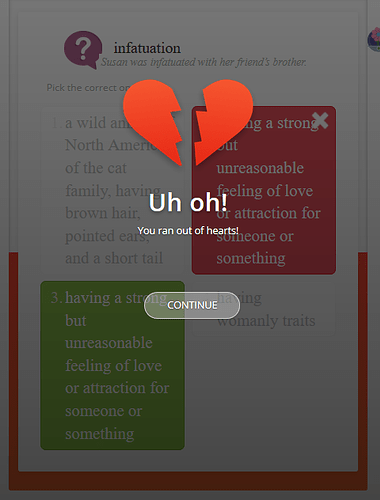looks like it isn’t
Yes, I noticed the same
Looong, looong, akochove replied:
- Thanks for fixing the text - the audio still says ‘with’… In the past you said you couldn’t fix that because you didn’t have the audio. I might know somebody who is willing to record it, if you made that person contributor. Interested?
@csaba.olah.942 - is not active here, let alone that he reads these messages!
@akochov: are still curating this course? If not, please let us know who is or if somebody is allowed to take over. Thanks anyway for providing a course with fun words. It’s difficult to come by a good collection ‘rare words’.
- A-Train (NYC Subway Service) says ‘a train’ (‘a’ as we pronounce the article). I suppose it should be pronounce ‘A’ (the letter ‘A’ of the alphabet).
2b: NYC: does that mean New York Center? - “To prounounce a sentence” = “declare a sentence at court” → this explains ‘to pronounce’, but not ‘sentence’, and the meaning is very different from “writing a sentence”. Would ‘declare a punishment (or: sanction, or penalty) at court’
Hallo all. Olaf advised me to post here.
I found some bugs in the course (may be they are already known)
- Sometimes (when passing quick tests) the application offers to select an answer from duplicate variants. Of course, I often choose “incorrect” answer.
- Some questions contradict grammatically with the right answer (for example, the question refers to a verb while the answer is a noun. It disorientates. (I dropped the screenshot because there is a limitation here)
- When selecting an answer in quick test using the keyboard, the focus sometimes relocates on another answer box at the time of pressing “Enter.” It irritates ((
Best Regards, Yuri
Cheers for posting, @yshindin!
I’d also like to point out that there’s issues with the course (I’m working on it as well):
- articles are sometimes required, sometimes not
- sometimes the definite article is required, sometimes the indefinite article
- verbs sometimes require to be preceded by “to”, most of the time they aren’t
As nobody has posted here over the past ten months: is this course still being maintained? The original creator of the course (csaba.olah.942) doesn’t seem to have an account here on the forum.
It seems you took over, @akochkov. I’d like to offer my help, you’d just have to add me as a course contributor.
I could also get rid of the phantom entries which are currently existing in the course.
Hi!
Sorry for inactivity, but lately I have no time for maintaining this course.
So if someone wants to step in - that would be awesome.
Anytime you want - just add me as a contributor.
I am very happy we have such an advanced course, i need to test it out asap ^^ <3  I hope it is of high quality free of bugs and whatever
I hope it is of high quality free of bugs and whatever
Here is another example. The question suggests that the answer is a verb, but the “right” answer turned out to have no “to.”

@akochkov it would be nice if you could do this so someone can work on the problems. The most urgent (IMHO) corrections would include prefixing all verbs with to and nouns with a resp. an. Also, there’s a bunch of phantom entries that I’d take care of. These make it hard to choose the right answer (i. e. “put up with”, “to put up with” and “… put up with”).
As @akochkov seems to no longer be active I have asked Memrise to add me as a contributor which has happened just now.
Before I go ahead and start changing data: as this is a typing course the changes that I have in mind might confuse learners once the changes have been performed. These include stuff like adding an undefined article to nouns, prefixing verbs with “to” and stuff like that - these are more or less the main/fundamental problems that made the process of learning hard for me.
Due to the 1679 items I’m also certain that it’ll take some time before I have worked my way through, so you might have to expect a few bumps here and there for the time being as I might have to perform changes in batches (levels).
Any objections or additions out there?
No objections so far, but not much feedback either. I’ll start working on things now, starting out with the most annoying problems first. These include:
- prefixing all verbs with to resp. to be
- prefixing nouns with a resp. an
- fixes for errors, clarifications and amendments/annotations
If you have encountered anything else, please let me know here!
As far as I know, we rarely use the word “substantive” to refer to nouns in English. We nearly always just use the word “noun”.
It’s used in Swedish and German to refer to a noun, but in English it is usually used as a synonym of “substantial”.
Cheers! I’ve replaced this in my last two posts.
I’ve finished the first batch (approx. 620/1677 entries). I’ll try to work on the rest ASAP, but this might take until later next week.
Please note that, due to the nature of the Memrise database which makes it extremely nerve-racking to change data in levels, the changes have not been performed in a level-wise manner. Instead, I have changed data “page-wise” as presented by the system.
If you use the web application to work on the course you should see the changes right away. If you use the app, you’ll have to log out and back in on order to receive the updated material.
F’up to this post on another thread:
I will fix spelling errors along the way, but my present primary objective is to standardize the way that answers are expected (i.e. prefixed with to for verbs and a/an for nouns).
That said, I’m afraid that I am unable to present alternative spellings/wordings. The reason is that we would need an additional column for that and as I’m only a course contributor, I can only work with the current column setup.
FWIW, I’ve seen numerous requests by users to grant more rights to contributors (particularly to otherwise abandoned courses) but this has so far been ignored by Memrise. I don’t know how long those requests go back (I’ve only been around 20 months), but I suppose this has been around for quite a bit longer than that …
I’ve finished the revision of the vocabulary. Apart from prefixing verbs and nouns I’ve made a bunch of corrections, provided additions, deleted duplicates, removed a few items that made no sense, a. s. o…
I’ve also thrown the script that attempts to eliminate phantom entries several times at the course.
If you intend to work on the course with your mobile device (Android, iPhone, etc.) remember that you will need to log off from your Memrise account and then log back in.
Your feedback is always welcome!
Hello, Dear Olaf.Rabbachin
Sir, I love your course, I’m am half-way throught it :-D, but there are some REALLY redundant strange phrases which, I believe, should be removed from the course. Some of these are:
- fond madness;
- in hot.
Best Regards,
Hank
Hank, thanks for the nice words, but the course is not “mine” - I only happen to be a contributor!
Regarding the words you mentioned: I’m with you 100%. There’s also other words that I don’t think make much sense (one that comes to mind is A-train). But since I’m really only helping out it doesn’t feel right to just delete entries, although I have done so for duplicates.
Please just go ahead and ignore the entries that you don’t want to be tested on.
See here for information on how to ignore words:
https://memrise.helpshift.com/a/memrise-learn-a-new-language/?s=getting-started&f=can-i-ignore-words-1513089692
You can also find information here in the forum.
Hello! Why did you add to before verbs and a before nouns? I really liked this course, because, unlike the other English courses, one could conveniently and quickly write the words without repeating the to hundreds of times!
Good job on the course! I love it!
@Plat, I’m sorry if this irritates you. I had spent quite some time thinking about this and even asked here for other opinions (no feedback received ![]() ). The reason that I even thought about adding a(n) and to prefixes was that I discovered many inconsistencies while learning. That is, there was times at which a prefix was required (both for verbs and nouns) and others when it wasn’t. I felt this beyond obnoxious.
). The reason that I even thought about adding a(n) and to prefixes was that I discovered many inconsistencies while learning. That is, there was times at which a prefix was required (both for verbs and nouns) and others when it wasn’t. I felt this beyond obnoxious.
Now I am only less than 25% into the course, but when I became a contributor and checked the whole set, it became apparent that this got worse and worse in the later levels.
So I contemplated removing all prefixes altogether but then I checked again and, as expected, found words that are being presented both as a verb and as a noun. I’ve seen many courses where this can result in both words being presented as multiple choice and the selection being treated as wrong even though the two answers are identical. I wanted to avoid that, so the only viable/dependable solution was to just prefix everything.
Also, it was often not discernible whether a source word or phrase was meant to be translated as a noun, adjective or verb, so I fixed that along the way.
I hope that makes it at least understandable. FWIW, nothing’s carved into stone - if I see more voices against the change and a discussion on how to do better, I’ll consider reverting everything resp. accept a majority’s decision!

